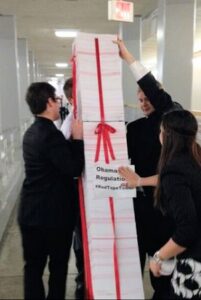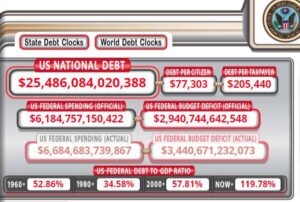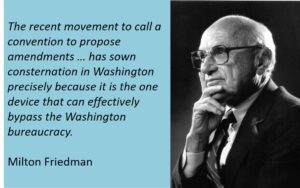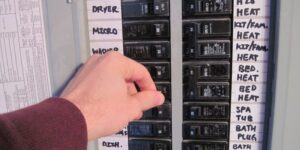A Power Check Amendment for the US Constitution via Article V
[Editor: We participated in the gathering recapped here: it was a proposal for a Constitutional amendment. A simulated Article V convention intended to return the central power of government back to the people. For instance, it could be used today to overturn SCOTUS’s May 30th, 2020 ruling on limiting church attendance in California (states can now legally limit worship attendance). This amendment would return government to we the people]
If We the People could add just one amendment to the Constitution, what should it be?
What one amendment would restrain, continuously and simultaneously, the excesses of Congress, the Supreme Court, and the President?
What one amendment would shift the broad balance of powers back towards our state legislatures and away from the Federal leviathan?
What one amendment would be the most most difficult for the political donor/lobbyist/crony-capitalist cartel in Washington to ignore, escape, or pervert?
On December 5, 2015, in Tempe, the Arizona chapter of Convention of States held a seminar that broke into several working groups to answer questions like the ones above. The short Power Check amendment below is based on the output of one of those groups.
Amendment XXVIII [DRAFT]
An Amendment to Check the Power of the Federal GovernmentSection 1.
The several state legislatures, by a three-fifths majority vote, shall have the power to:
(1) repeal, in whole or in part, any law passed by Congress,
(2) reduce any line item in any appropriations or other spending legislation,
(3) vacate, in whole or in part, any ruling of the Supreme Court or inferior federal court,
(4) cancel, in whole or in part, any Presidential executive order or guideline,
(5) withdraw, in whole or in part, any regulation issued by any Federal agency or department.Section 2.
(1) In any action under this amendment, each state legislature shall have exactly one vote, and none of the actions shall be subject to judicial review.
(2) Each action shall become effective on the day that the three-fifths-majority requirement is met.
If We the People could successfully ratify an amendment like this, imagine how much more respectful and responsive Washington would have to be towards We the People, who, after all, must pay for everything Washington does.
For example —
- Section 1, Clause 1:
Egregious overreaches like Obamacare, Dodd-Frank, and Sarbanes-Oxley, that hurt working families and cripple free enterprise could be partially or fully repealed by We the People. - Section 1, Clause 2:
Multi-thousand-page, multi-trillion-dollar spending bills, written in secret and passed at the 11th hour, could be struck down by We the People on a line-by-line basis at any time, eliminating “pork” provisions without incurring “government shutdown” blackmail. Abusive or failing federal departments or agencies could have their funding cut or eliminated altogether by We the People, with or without the concurrence of Congress, SCOTUS, or the president.  Section 1, Clause 3:
Section 1, Clause 3:
We the People could vacate noxious SCOTUS rulings on social engineering and morality issues that We the People judge to be outside that court’s Constitutional responsibility.- Section 1, Clause 4:
Executive orders, like the old Obama “pen and phone” orders on immigration, could be explicitly nullified by We the People. - Section 1, Clause 5:
Overreaches by EPA, HHS, FCC, BLM or any of the other 400+ federal regulatory agencies and departments could be struck down by We the People.
In a single stroke, this Power Check amendment or one like it would deliver a long-overdue attitude adjustment to Washington. Like a missile in a silo one wishes never to fire, its mere presence in the Constitution would force Congress, SCOTUS, and POTUS to look over their collective shoulders with every bill, ruling, or order they consider, knowing that We the People, through our state legislatures, could reverse virtually anything they do.
That is how it should be, and should have always been, in a government that is truly of, by, and for the people.
Going forward, an amendment like the one above would put real teeth into the Declaration of Independence phrase “deriving their just powers from the consent of the governed.” Congress, POTUS, and SCOTUS would be mindful of needing that consent every day instead of just once every two, four, or six years at the ballot box.
Furthermore, and in particular —
 We now have an operating debt of over $25 Trillion and unfunded obligations of over $200 Trillion. Clearly, the original checks and balances in our Constitution have proven insufficient for the federal government to control, on its own, its virtual addiction to power, spending, and entitlement promises that we taxpayers simply cannot underwrite. As with any out-of-control addiction, an explicit intervention is called for. We the People therefore must enlist our state legislatures to provide that intervention.
We now have an operating debt of over $25 Trillion and unfunded obligations of over $200 Trillion. Clearly, the original checks and balances in our Constitution have proven insufficient for the federal government to control, on its own, its virtual addiction to power, spending, and entitlement promises that we taxpayers simply cannot underwrite. As with any out-of-control addiction, an explicit intervention is called for. We the People therefore must enlist our state legislatures to provide that intervention.
Every state legislator should welcome the responsibility and obligation to wield an amendment like the one above and/or those in Mark Levin’s Liberty Amendments on behalf of his or her constituents. Any legislator who does not should resign his seat to make room for another who will.
Now then —
 Could we ever hope to get an amendment like the one above ratified? The short answer is YES. The process for it was placed in our original Constitution in Article V by the Framers who presciently foresaw the day when the central government would become overbearing and drunk on power, just as it has.
Could we ever hope to get an amendment like the one above ratified? The short answer is YES. The process for it was placed in our original Constitution in Article V by the Framers who presciently foresaw the day when the central government would become overbearing and drunk on power, just as it has.
Most Americans are still unaware that the states can amend the US Constitution without the permission or approval of Congress, the Supreme Court, or the President. The particulars of Article V are well covered at web sites like ConventionofStates.com and in Levin’s best-seller The Liberty Amendments.
Naturally, concerns about Article V have been voiced from the both the left and right. Those concerns are well-addressed at this link. A large part of the opposition centers around a theory that with free elections as leverage, the Constitution ought to work “as is” without modification. But it hasn’t, and it doesn’t. How much more proof do we need?
While surely necessary, free elections alone have obviously not been sufficient.
Many other potential amendments have been proposed via Article V. Some are lengthy and complex, dealing narrowly with our national debt, including various emergency exceptions to ceilings on debt. Virtually all the proposals have merit, but in my opinion, the Power Check amendment is the broadest, simplest, and most universal solution to reining in the runaway federal government on all fronts — legislative, executive, and judicial.
 Like the bank of circuit breakers that protect my house from an electrical overload, this amendment will stand ever ready. For example, and in particular, it could be used when a House Speaker attempts to bulk up an emergency pandemic relief bill with non-germane pork, hoping to hold We the People hostage to her wishes. Under Section 1, Clause 2, the Speaker’s pork provisions could be struck down on a line-by-line basis as soon as 30 states agree to do so without the need to wait for further legislation or the next election cycle.
Like the bank of circuit breakers that protect my house from an electrical overload, this amendment will stand ever ready. For example, and in particular, it could be used when a House Speaker attempts to bulk up an emergency pandemic relief bill with non-germane pork, hoping to hold We the People hostage to her wishes. Under Section 1, Clause 2, the Speaker’s pork provisions could be struck down on a line-by-line basis as soon as 30 states agree to do so without the need to wait for further legislation or the next election cycle.
Finally, the Power Check amendment is an emphatic affirmation that We the People are still in charge — not our politicians and Big Government’s all-too-often-drunk-with-power regulatory agency bureaucrats.
Time is short. If we do not use the authority left to us by the Framers in Article V, the sheer weight, power, cost, complexity, ineptitude, and corruption of the professional political/lobbyist/donor class in Washington will surely sink our country, and we’ll have no one to blame but ourselves.
David Leeper is a retired engineer living in Scottsdale, AZ, with his (first) wife of 47 years. He is currently a volunteer science teacher at AzScienceLab.com. In his fun-filled 40-year career, he held positions from lab technician to technical vice president at AT&T Bell Labs, Bellcore, Motorola, and Intel. He holds 16 patents in telecom technology and a PhD in electrical engineering from the University of Pennsylvania. Since 2011, he has written over 1000 political commentaries.

